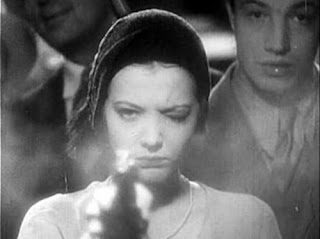Get your tivo aligned, for there are pre-code essentials coming your way this week on TCM that are unavailable on DVD. If you don’t record them, or at least see them. You’ll be, well, out of luck. And we wouldn’t want that, not in November when daylight savings makes the curtain of night crash down so very early and the warm cozy joy of staying home with hot tea and crumpets and a remote all but irresistible to cinephiles such as thyself.
Playing a loose conglomerate of Clara Bow, Thelma Todd, and herself, Jean Harlow comes through in metatextual spades here as an overworked MGM starlet, earning her place at the top of the spitfire heap with rapid fire slang-filled dialogue pouring in satin torrents from her tongue as she goes zipping, 8 1/2-style, through a carnival of blustery studio heads, make-up artists, insurance fraud grifters, drunken joneser fathers (Frank Morgan, partying like it’s 1899!), an accented gigolo lover, an infatuated director (Pat O’Brien), and Lee Tracy as an unscrupulous publicity agent.
There’s something smarmy about Tracy, but he sure can talk fast and believably think on his feet. Even when he apologetically comes to tell Harlow he’s been fired on account of her complaints, you don’t notice his emotions, you just stare at the ferocious meta-amphetamine insect anger in his sharply slicked-back hair. In order to appease Harlow and get his job back, Tracy must pledge to cease sleazing her up in the tabloids and instead put her onto the ‘home and garden’ page, dressing her up in frilly aprons, with forks and potatoes in her hand, longing wistfully for the patter of little feet. In a hilarious interview with a matronly journalist, Harlow holds her hands clasped together and gazes into the heavens, imagining the baby to come, then sets off to adopt one, ala Angelina Jolie, picking them out by the bushel.
ONE WAY PASSAGE (1932) – Thursday at 9:30 PM EST (11/10)
The chemistry between Francis and Powell is electrifying yet urbane and smooth, like a very expensive cognac warmed by the fire. He’s a caught criminal sailing home to face execution and meeting Francis and falling in love.. and her character is dying and only has a few weeks to live. Aline McMahon and Frank McHugh are the comedic second leads and great as usual. Romantic comedies nowadays are full of children in grown up bodies, trying to make mothers out of each other so they can cry in a lap again and not lose themselves in unconscious consumerism and vehement, self-righteous denial. ONE WAY PASSAGE, by contrast, is laden with grown-ups, and not a drop of stuffy morality taints their beautiful inherent decency as they walk to their deaths like it’s just another ocean voyage. One of the best recovered jewels in the TCM canon.
CITY STREETS – (1931) – Saturday at 9:30 AM (11/12)
It seems dimwitted to call this film CITY STREETS–one imagines treacly Chaplin Americana with the Dead End Kids as extras– and its plot device of an alcohol kingpin risking his whole operation thinking he can muscle in on Gary Cooper’s girl seems kind of ridiculous, but for all that this film is actually sleazy, unrepentant, and stylized. Murders are talked over via close-ups of cat statues, and a very dirty fella named Blackie gets offed by Guy Kibee (as you’ve never seen him before!).
Shades of SCARFACE in Dashiell Hammett’s storyline fills the sails with snappy patter and keeps the coffers rich in minute detail that feels observed rather than imagined and, that title aside, free of any remote chance of gangster cliche. It’s like a molten crucible of gangsterism, with everything post-code being molds of moulds.
That said, Sylvia Sidney’s pleas to Cooper: “Kid, don’t go! Oh no Kid! No, Kid, please don’t go if you love me, if you love me kid please don’t go”–drag on and on until it sounds like Mel Blanc doing a Bugs Bunny put-on. Still, there’s a super sexy scene of passion across a wire screen in the ladies’ prison visiting room, and Sylvia has the coolest vanity mirror ever (a giant vulture/eagle over it, with wings outspread). Visceral expressionist photography (restored with a loving hand), great dialogue (including hilariously curt rapport between thug Kibee and daughter Sydney) and Cooper is at his most ravishing.













